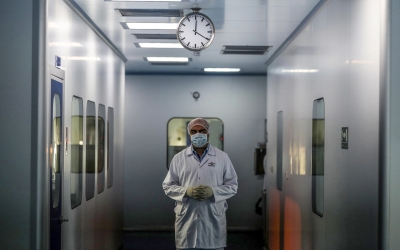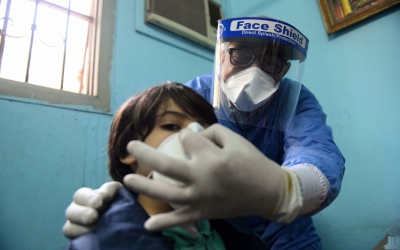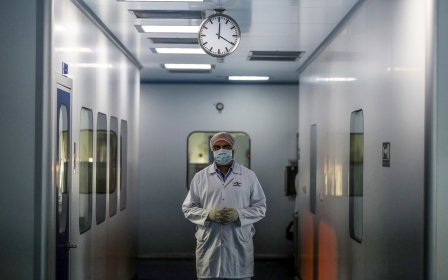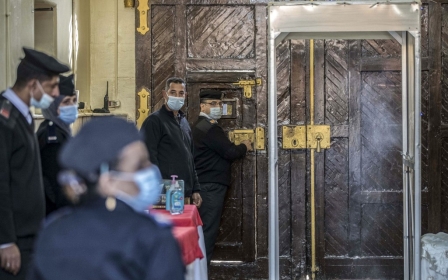'Unlawful': Backlash against Egypt's plan to offer Covid-19 vaccine for money
Millions of underprivileged Egyptians will struggle to afford Covid-19 vaccines after the government announced it would charge people to receive them, threatening the country with a third wave of the pandemic, health experts and economists have warned.
The government recently unveiled plans that would allow only four percent of the North African country's 100 million people to receive the free jab.
In response, a leading lawyer has filed a lawsuit against the Egyptian president, the prime minister and the minister of health to force them to offer the vaccines to citizens for free.
'You cannot force people to pay for vaccine shots that are becoming indispensable for the eradication of this very dangerous disease'
- Khaled Ali, lawyer
Charging citizens for the vaccines violates the law and will put additional financial pressures on a public already consumed by economic burdens, lawyer and human rights advocate Khaled Ali said.
"You cannot force people to pay for vaccine shots that are becoming indispensable for the eradication of this very dangerous disease," Ali told Middle East Eye. "This is unlawful."
New MEE newsletter: Jerusalem Dispatch
Sign up to get the latest insights and analysis on Israel-Palestine, alongside Turkey Unpacked and other MEE newsletters
Egyptian law commits the government to distribute vaccines for free at times of pandemics.
Ali filed his lawsuit at the Administrative Court, which rules in disputes between the government and citizens, shortly after the Egyptian government released plans to provide citizens with the long-awaited Covid-19 vaccines for money.
Minister of Health and Population Hala Zayed revealed on 24 January that her ministry would give the jabs to financially incapable Egyptians only for free.
"As for other members of the public, they will have to pay for the vaccines," she added.
Zayed's remarks about charging citizens for the Covid-19 shots contradict instructions by Egyptian President Abdel Fattah al-Sisi in December to give the vaccines to Egyptians for free.
Sisi said the Long Live Egypt Fund, a mechanism of the Egyptian presidency for helping slum dwellers, poor villagers and financially incapable Egyptians, would be responsible for providing the necessary money for purchasing the vaccines from international producers.
However, the minister of health said only those registered in the national Solidarity and Dignity welfare programme would get the vaccines for free.
Around four million people are registered in the programme which provides them with monthly financial support.
These are mostly widows, unemployed single mothers and elderly or disabled Egyptians who do not have sources of income.
Nevertheless, this is a fraction of the population of over 100 million, Ali said.
"The government will just be putting financial pressures on the public by doing this," Ali said. "Some people cannot pay for the vaccines."
The Ministry of Health has already started rolling out the vaccines to medical staff members at the nation's isolation hospitals.
Thousands of health service workers standing at the frontline of the national response to Covid-19 have already started taking the first doses of the vaccine.
Egypt has already received 100,000 doses of the Chinese Sinopharm vaccine from the United Arab Emirates and 50,000 doses of the AstraZeneca vaccine from India.
Health authorities say, meanwhile, that they will depend on a wide range of vaccines to immunise members of the public against the new disease.
After health service workers, senior citizens, especially those suffering chronic diseases, will be immunised, the Ministry of Health says.
Calls for donations
Egypt apparently has problems making the necessary financial resources available for purchasing the vaccines.
The government said earlier that it needs $800m to buy vaccines for citizens.
Pro-government media outlets have already started appealing to businessmen to donate money for the purchase of the vaccines.
The religious establishment has also stepped in to encourage financially able Egyptians to donate money for this purpose.
A senior official of Dar al-Ifta, the body responsible for the issuance of edicts for Egypt's Muslim population, said Muslims can channel their Zakat (charity) for the purchase of the vaccines for the poor.
Egypt's economy was hit hard by the Covid-19 pandemic which negatively affected most economic sectors, including tourism.
The pandemic has not affected Egypt's exports of vegetables and fruit, but the pandemic-induced global recession has hit other exports, including construction materials and other goods.
"The pandemic affected the economy greatly and this was manifest in all economic sectors," Yumn al-Hamaqi, a professor of economics at Cairo University, told MEE.
Egypt's economy grew by 2 percent in 2020, down from 6 percent projected for the same year by the government. The economy is expected to grow by 5.4 percent this year if conditions improve.
Regular vaccination
Zayed said members of the public would have to pay for the vaccines, given the fact that the vaccination process might turn into a regular practice.
"The citizens might need to get the Covid-19 jabs regularly as they do the flu jabs," the minister said.
To some extent, specialists said, this will be the case since the duration of the immunity the vaccines would provide is not yet known.
"People will need to get the vaccines regularly, not only here, but also everywhere else around the world," leading pulmonologist Hesham Abulnasr told MEE.
However, this is not a problem that has to be solved by forcing citizens to pay for the vaccines, Ali said.
"People are suffering economically already because of the pandemic," he said. "The timing of the decision itself is very bad."
This is very true in the case of millions of poor Egyptians who are struggling to overcome the negative economic effects of the pandemic. Most of these people are not registered in the Solidarity and Dignity programme, even as they cannot put food on the table for their children.
Around 29.7 percent of Egypt's population was poor in the fiscal year 2019/2020, which ended in June last year, according to the government.
Around 7.3 percent of the national workforce of 27 million was also unemployed in the third quarter of 2020, the government says.
Zayed said the vaccines can be sold for 100 Egyptian pounds ($6.5) a dose.
Nonetheless, for people like Mohamed Sedki, a private sector worker in his mid-forties, this is a huge amount of money.
"This is why I will not buy the vaccines," Sedki, a father of two children, told MEE. "We will only follow the preventive measures."
Threat of a third wave
Egypt is reporting decreasing daily Covid-19 infections and deaths as the authorities move ahead with the implementation of a series of measures, including mandatory facemasks in public places, in their bid to contain the disease.
Daily infections reached 541 and deaths 44 on 1 February, the lowest since December.
'There can be a third wave of Covid-19 if health authorities do not immunise enough citizens. This is why I think charging the public for the vaccines is far from wise'
- Rushdi Youssef, pulmonologist
The daily infections and deaths are expected to decrease further in the coming period, with the authorities moving ahead with the implementation of preventive measures, including a ban on gatherings, such as wedding parties and mourning ceremonies.
Egyptian authorities also closed down schools and the universities in January to put a lid on rising infections.
However, Ali, a former presidential candidate, is afraid that charging the public for the vaccines would scare millions of people away from these vaccines for financial reasons.
"I believe the government is legally and morally responsible for giving these vaccines to these people," Ali said. "The fact is that many people will drop the idea of getting the jabs, because they do not have money."
This can be very dangerous, specialists said, especially if many people opt not to take the vaccine because they can't afford it.
Zayed said earlier that 70 percent of the population has to get the jabs for the necessary herd immunity to be achieved and for Egypt to contain the disease.
Nevertheless, by making the vaccines available only for those who have money, the authorities will fail to put an end to this disease, specialists said.
"There can be a third wave of Covid-19 if health authorities do not immunise enough citizens," Rushdi Youssef, another pulmonologist, told MEE.
"This is why I think charging the public for the vaccines is far from wise."
Middle East Eye delivers independent and unrivalled coverage and analysis of the Middle East, North Africa and beyond. To learn more about republishing this content and the associated fees, please fill out this form. More about MEE can be found here.








